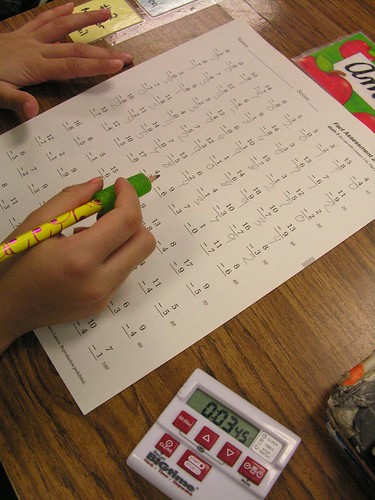 As most of my Tuesday's go, I helped to facilitate the #edchat that takes place on Twitter from 7-8pm. We were joined by teachers, administrators, parents and, for the first time, students. Our topic this week; What teaching methods motivate students to enjoy learning? It was a fascinating discussion. Here is what some participants had to say:
As most of my Tuesday's go, I helped to facilitate the #edchat that takes place on Twitter from 7-8pm. We were joined by teachers, administrators, parents and, for the first time, students. Our topic this week; What teaching methods motivate students to enjoy learning? It was a fascinating discussion. Here is what some participants had to say:- I feel that teachers need more training in being "facilitators." Students need choices and need to feel that they are part of the learning process. Teachers need more training in how to use Web 2.0 tools. Their training should consist of a lot of modeling by classroom teachers who actually use the tools. Administrators also need to see the benefits of using the latest technology in the learning process.
- Real world experiences, cooperative learning, changing the environment, facilitation, integrating tech, and allowing students to have choices regarding what topics they want to explore and how they would like to present the material.
- Students are motivated by the excitement of teachers and other students. Giving students choices and input in their learning will also help motivate them. We need to concentrate on encouraging other teachers to motivate students and update their teaching practices.
- Methods that bring relevancy to the material are what motivates students to enjoy learning. I saw several post about teachers needing to makes changes within themselves first and I agree with that 100%. What worked 30 years ago does not work now and that applies to any teacher that is reluctant to bring forth new innovations and discoveries in their classroom.
- Students need to know what meaning there is in the learning. Students can understand the steps/the process, but if there is no application to their lives, what motive is there for remembering?
- I was interested in the emphasis on real world application and student choice. There wasn't a lot of disagreement. However I started thinking, what does "real world" mean? Bills, taxes, 9-5, chores. Is this what we mean by "real-world" in education? I think we mean some kind of ideal world where people pursue their interests regardless of the constraints of authority. If we mean that we can prove that some one, some where uses the topics we teach, that is different (and probably not motivating).
- I think it all goes down to how well the teacher interacts with the class and then introducing them to technology that supports their learning. I try and use lots of simple applications that the students can master -especially in terms of collaborating eg online whiteboards/Google docs etc.
As is true with most of our chats, several themes kept coming up over and over again. In order to motivate students, we as educators must be motivated ourselves. Students pick up on passion. They know when you walk in your classroom and you are not excited about the subject or topic you will be teaching and will not be motivated themselves. Why would they? However, if you walk in everyday, excited to be there, show enthusiasm for what you are teaching it will ultimately translate to your students. You have passion for what you do, now show your students.
Showing students your passion goes right along with another theme that came up over and over. Students need know who is teaching them and teachers need to get to know their students. Do you need to know everything? No (and there are just somethings we don't need to know!) But you need to know the types of students you are teaching. You need to understand where you students come from. If students feel like you have made a connection with them they will want to work for you.
Real world experiences are really the way to get your students excited about learning. Relevancy. You have to provide connections to what students are learning in your class to what students are doing or will do. For some subjects, that's easy. For others, like Mathematics (especially upper-level mathematics) it is hard for student to translate what they learn to why they need to learn it. Having more student-centered, problem-based, real-world activities are, I believe the key to motivation in the classroom.
So, what do you think? What is the key to motivation? Do you have any tips or tricks to share. What have you done that has work or not worked. Is it even the job of the teacher to motivate students? Should students be motivated to learn because it's the "right thing to do?"
Photo Credit-1) "Hold out your hand, Monsignor!" (Photo provided by listverse.com)
















